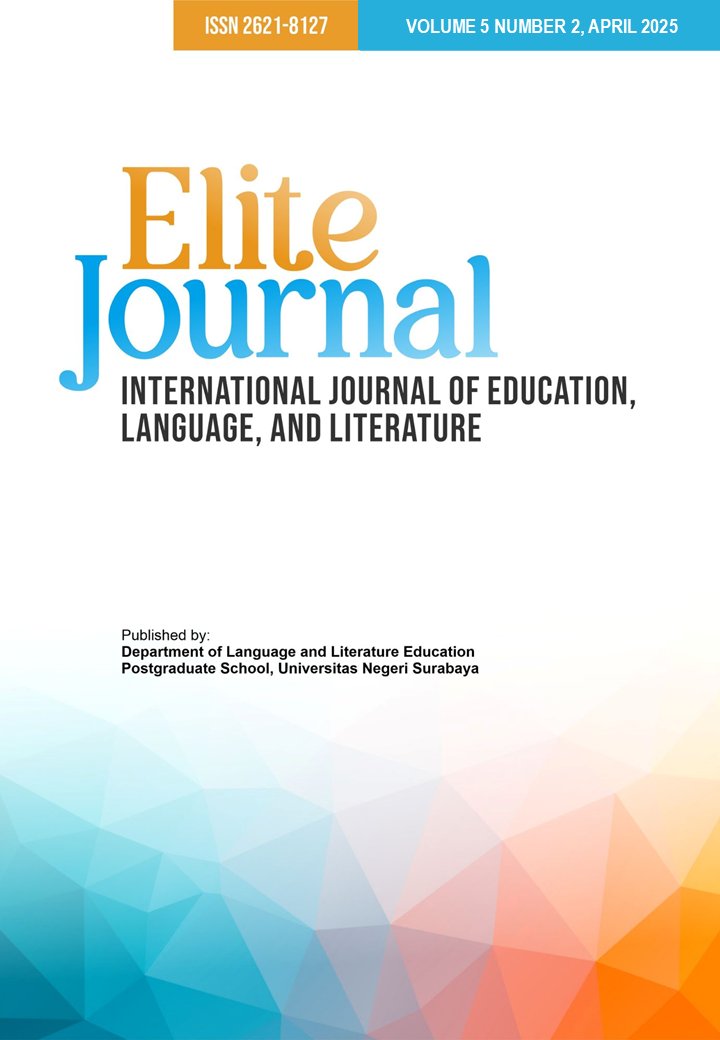NAVIGATING THE DEVELOPING LEXICOLOGICAL LANDSCAPE: A SYSTEMATIC LITERATURE REVIEW
DOI:
https://doi.org/10.26740/elitejournal.v5n2.p41-50Keywords:
method study, systematic literature review, lexicologyAbstract
It is hoped that the basis of linguistics is related to the use of the systematic literature review or SLR research method. This SLR method can dig deeper and be more precise so that it can observe, study, assess and interpret existing research and of course it will be interesting to discuss, especially the discussion here is about the basics of linguistics, And the discussion of lexicology is very dynamic because changes occur in society from time to time and social phenomena always continue to change in society, in this SLR method it is very good to be applied in research, it is related to the science of lexicology, in this SLR method reviews can be carried out or reviewing a journal, article, book, or other type of document in a coherent manner and each step follows the procedures or rules that have been determined. So that the final results of the research can show accurate results without engineering and are more compatible.
References
Chaer, A. (2007). Indonesian lexicology and lexicography. Jakarta: Rineka Cipta.
Fakih, M. (1999). Gender analysis and social transformation. Yogyakarta: Student Library.
Francis, C., & Baldesari, F. (2006). Systematic reviews of qualitative literature. Oxford: UK Cochrane Centre.
Hanney, S. R., Gonzalez-Block, M. A., Buxton, M. J., & Kogan, M. (2002). The utilization of health research in policy making: Concepts, examples, and methods of assessment. Geneva: World Health Organization.
Haas, P. J., & Springer, J. F. (1998). Applied policy research: Concepts and cases. London: Garland Publishing.
Jones, P. (2009). Introducing social theory (A. F. Saifuddin, Trans.). Jakarta: Indonesian Obor Foundation. (Original work published year not provided)
Keraf, G. (2007). Diction and style language. Jakarta: Scholastic.
Kitchenham, B. (2004). Procedures for performing systematic reviews. Eversleigh: Keele University.
Kridalaksana, H. (2007). Word classes in Indonesian. Jakarta: Gramedia.
Kridalaksana, H. (2007). Formation of word classes in Indonesian. Jakarta: Gramedia.
Kridalaksana, H. (1988). Linguistic dictionary. Jakarta: Gramedia. (Note: "IKIP Poor" seems like an error—should it be IKIP Malang? Please clarify if needed.)
Langer, B. (2005). Emile Durkheim. In P. Beilharz (Ed.), Social theory: A guide to central thinkers (S. Jatmiko, Trans., pp. page numbers). Yogyakarta: Student Library. (Original work published year not provided)
Lewin, S. (2008). Methods to synthesise qualitative evidence alongside a Cochrane intervention review. London: London School of Hygiene and Tropical Medicine.
Lukács, G. (2010). History and class consciousness: Studies in Marxist dialectics (I. R. Muzir, Trans.). Yogyakarta: Ar-Ruzz Media Group. (Original work published 1923)
Munro, S. A., Lewin, S. A., Smith, H. J., Engel, M. E., Fretheim, A., & Volmink, J. (2007). Adherence to tuberculosis treatment: A qualitative systematic review of stakeholders’ perceptions. BMC Public Health, 7(1), Article 1.
Muslich, M. (2009). Indonesian phonology. Surabaya: Bumi Aksara Press.
P3BI. (2001). Kamus besar bahasa Indonesia [Big Indonesian Dictionary]. Jakarta: Hall References. (Note: usually abbreviated as KBBI; "Hall References" may be incorrect, usually "Balai Pustaka.")
Perry, A., & Hammond, N. (2002). Systematic reviews: The experience of a PhD student. Psychology Learning and Teaching, 2(1), 32–35.
Poerwadarminta, W. J. S. (2000). General Indonesian dictionary. Jakarta: Balai Pustaka.
Ramlan, M. (1990). Indonesian language science: Morphology. Yogyakarta: Gadjah Mada University Press.
Robins, R. H. (1992). General linguistics (S. Adinegara, Trans.). Yogyakarta: Kanisius.
Santosa, P. (n.d.). Indonesian language materials and learning. Jakarta: Open University. (Note: "TT" usually means "no date" = n.d.)
Siswanto, S. (2010). Systematic review as a research method for synthesizing research results: An introduction. Bulletin of Health Systems Research, 13(4), 21312.
Sunaryo, A. (1991). Methods for compiling dictionaries. Jakarta: Center for Language Guidance and Development.
Triandini, E., Jayanatha, S., Indrawan, A., Son, G. W., & Iswara, B. (2019). Method systematic literature review for platform identification and information system development methods in Indonesia. Indonesian Journal of Information Systems, 1(2), 63–77.
Varkevisser, C. M., Pathmanathan, I., & Brownlee, A. (2003). Designing and conducting health systems research projects. Canada: World Health Organization.
Verhaar, J. W. M. (1999). Principles of general linguistics. Yogyakarta: Gadjah Mada University Press.
Zgusta, L. (1971). Manual of lexicography. The Hague: Mouton.
Zgusta, L. (1979). Theory and method in lexicography. Columbia: Hornbeam Press.
Downloads
Published
How to Cite
Issue
Section
License
Copyright (c) 2025 Windi Yuliandari, Budianto Hamuddin

This work is licensed under a Creative Commons Attribution 4.0 International License.
 Abstract views: 352
,
Abstract views: 352
, PDF Downloads: 148
PDF Downloads: 148





